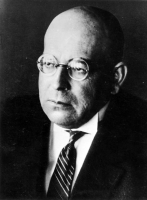| Oswald Spengler | |
| 奥斯瓦尔德·斯宾格勒 | |
| 奥斯瓦尔德·阿莫德·哥特弗里德·斯宾格勒 | |
|
Read works of Oswald Arnold Gottfried Spengler at 百家争鸣 | |
Oswald Arnold Gottfried Spengler (German: [ˈɔsvalt ˈʃpɛŋlɐ]; 29 May 1880 – 8 May 1936) was a German historian and philosopher of history whose interests included mathematics, science, and art and their relation to his cyclical theory of history. He is best known for his two-volume work, The Decline of the West (Der Untergang des Abendlandes), published in 1918 and 1922, covering all of world history. Spengler's model of history postulates that any culture is a superorganism with a limited and predictable lifespan.
Spengler predicted that about the year 2000, Western civilization would enter the period of pre‑death emergency whose countering would lead to roughly 200 years of Caesarism (extraconstitutional omnipotence of the executive branch of the central government) before Western Civilization's final collapse.
Spengler is regarded as a nationalist and an anti-democrat, and he was a prominent member of the Conservative Revolution. However, he criticised Nazism due to its excessive racism. Instead, he saw Benito Mussolini, and entrepreneurial types, like the imperialist mining magnate Cecil Rhodes, as embryonic examples of the impending Caesars of Western culture, notwithstanding his stark criticism of Mussolini's imperial adventures.
He strongly influenced other historians, including Franz Borkenau and especially Arnold J. Toynbee and other successors like Francis Parker Yockey, Carroll Quigley and Samuel P. Huntington.
John Calvert notes that he is also popular with the Islamists, who mobilize his critique of the West.
